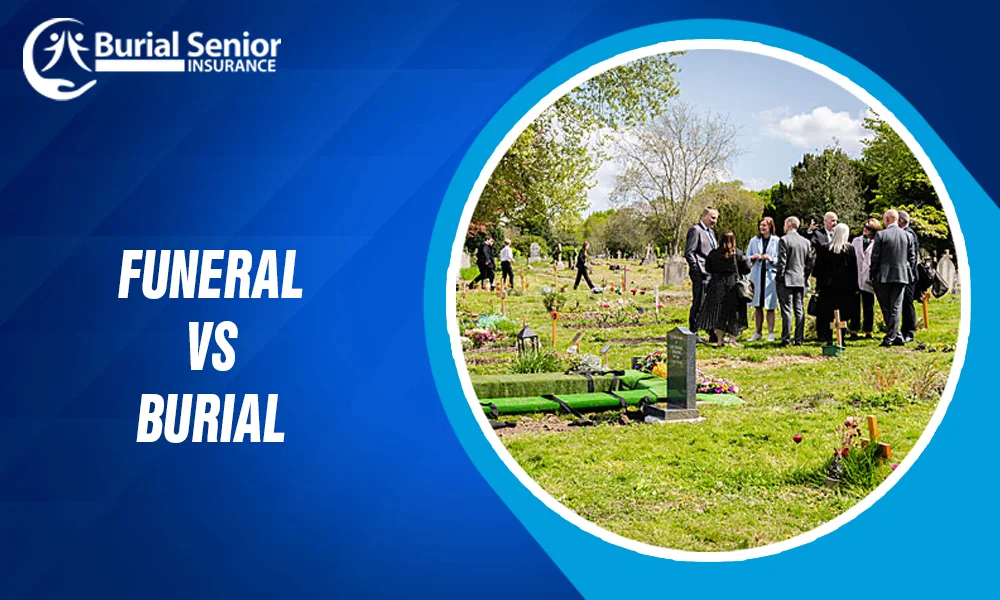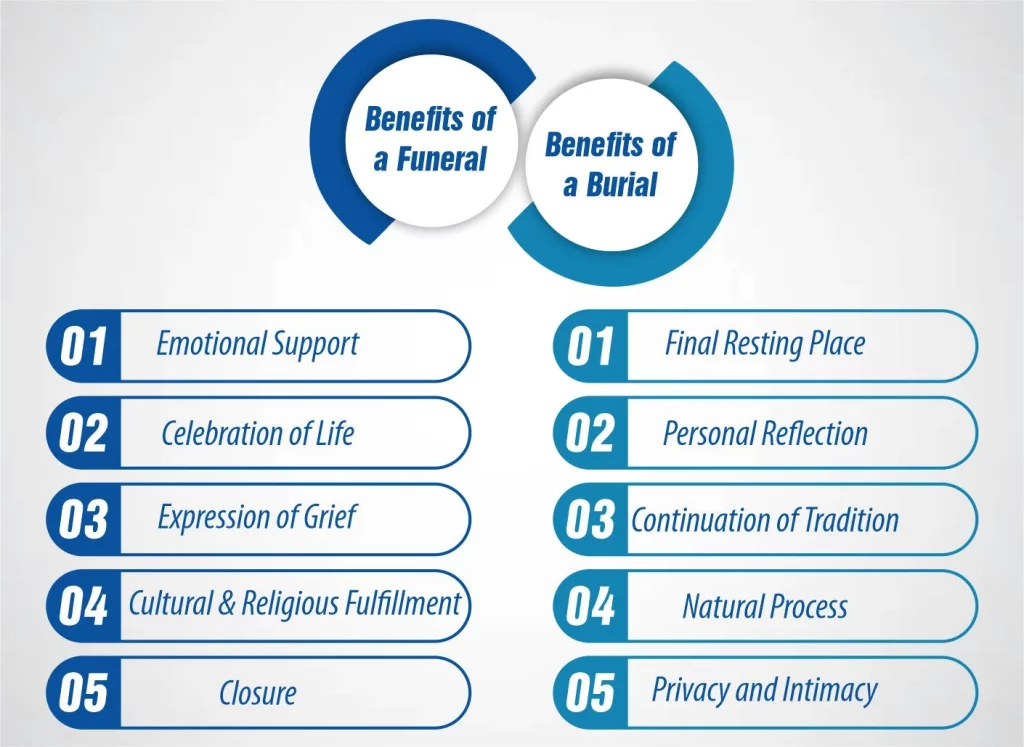Last Updated on: February 13, 2024
Reviewed by Kyle Wilson

Have you ever thought about how a funeral is different from a burial? When discussing funerals and burials, we discuss two important ways people say goodbye to loved ones who have passed away. A funeral is a ceremony for someone who has died. It’s a time when family and friends come together to remember the person’s life and say goodbye. There might be music, prayers, and stories about the person. A burial is when the person’s body is put into the ground, or their ashes are placed somewhere special. It’s just one part of the funeral. Even though both are about saying goodbye, they are not the same. It’s interesting how funeral vs burial helps us remember and honour people differently.
Customized Options Await
A funeral is a ceremony held honouring someone who has passed away. It’s a time for family and friends to come together to remember and celebrate the deceased’s life. The funeral can include various activities such as sharing memories, reading poems or religious texts, and playing music that is meaningful to the person who has died. The nature of the ceremony can vary widely depending on cultural and personal preferences, ranging from very traditional and formal services to more informal and personalized gatherings. It’s an important part of the grieving process, providing a space for mourners to express their sorrow, offer support to one another, and begin the journey of healing. Funerals can be held in various locations, such as funeral homes, places of worship, or even outdoors, and they may or may not be followed by a burial or cremation service.
A burial is the process of placing the body or ashes of a deceased person into the ground or a tomb. This act serves as a final resting place for the remains. Traditionally, burials involve laying the body in a coffin or casket, then placed in a grave usually marked with a headstone or marker. The process can vary widely across different cultures and religions, with some opting for above-ground entombments in mausoleums or crypts and others practicing natural or “green” burials without embalming or non-biodegradable materials. Burials are often accompanied by a ceremony or ritual, which can be part of a larger funeral service, providing a way for loved ones to pay their respects, say farewells, and commemorate the deceased’s life.

Both funeral vs burial carry distinct benefits that address the bereaved’s emotional, cultural, and personal needs. While funerals focus on communal support and the celebration of life, burials offer a tangible sense of finality and a personal space for ongoing remembrance. Together, they form a comprehensive approach to mourning, allowing individuals and communities to honour their loved ones in a manner that fosters healing and respect for the deceased.
Together, funeral vs burial encompasses a range of practices and rituals that communities and individuals use to cope with loss, honour their loved ones, and navigate the journey of grief.
The timing of a funeral after death can vary widely, influenced by cultural and religious traditions, personal preferences, and practical considerations. In some cultures and religions, such as Islam and Judaism, funerals are held very quickly, often within 24 to 48 hours after death, adhering to religious customs that emphasize prompt burial. Conversely, in many Western cultures, the funeral might occur several days or even a week after death, allowing family and friends to gather, make arrangements, and prepare for the ceremony. This period also provides a window for completing necessary legal formalities, such as obtaining a death certificate and finalizing funeral and burial plans. The chosen timeline can reflect a balance between honouring the deceased’s cultural and religious backgrounds, accommodating the logistical needs of those involved, and fulfilling any legal requirements.
The relationship between a funeral and a burial can vary, with burials sometimes occurring immediately after the funeral service and other times being scheduled for a later date. In many cases, especially within Western traditions, the burial is conducted right after the funeral ceremony, often as a part of the same day’s events. Attendees typically move from the location of the funeral service, such as a church or funeral home, to the burial site in a procession. However, certain circumstances, such as personal preferences, family logistics, or specific religious and cultural practices, might dictate a delay between the funeral service and the burial. For instance, in some instances, the family might choose to have a private burial later, or logistical challenges might necessitate a delay. The timing is influenced by various factors, including the availability of the burial site, the wishes of the deceased and their family, and sometimes the requirements of the chosen cemetery or burial ground.
In simple terms, funeral vs burial are two ways we say goodbye to someone who has passed away. A funeral is a unique service where we remember and celebrate the person’s life with stories, music, and being together. It helps us share our sadness and remember all the good times.
A burial is when we put the person’s body or ashes in their final resting place, like in the ground or a particular spot. This gives us a place to visit and think about them. Both funerals and burials are important because they help us deal with losing someone we care about, letting us lovingly remember them.

Burial Senior Insurance provides information and services related to burial insurance for senior citizens, including policy options and end-of-life support services.
Copyright © Burial Senior Insurance 2024. All Right Reserved.

Get Free Life Insurance Quotes